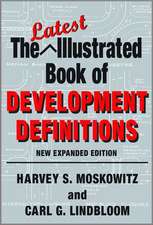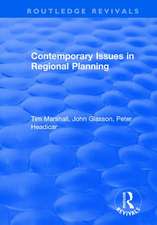The SAGE Handbook of Housing Studies
Editat de David F Clapham, William Clark, Kenneth Gibben Limba Engleză Hardback – 19 apr 2012
- Markets: examines the perception of housing markets, how they function in different contexts, and the importance of housing behaviour and neighbourhoods
- Approaches: looks at how other disciplines - economics, geography, and sociology - have informed the direction of housing studies
- Context: traces the interactions between housing studies and other aspects of society, providing context to debate housing through issues of space, social, welfare and the environment.
- Policy: is a multi-disciplinary and comprehensive take on the major policy issues and the causes and possible solutions of housing problems such as regeneration and homelessness.
Preț: 1111.41 lei
Preț vechi: 1355.38 lei
-18% Nou
Puncte Express: 1667
Preț estimativ în valută:
212.70€ • 221.59$ • 176.85£
212.70€ • 221.59$ • 176.85£
Carte tipărită la comandă
Livrare economică 11-25 februarie 25
Preluare comenzi: 021 569.72.76
Specificații
ISBN-13: 9781847874306
ISBN-10: 1847874304
Pagini: 528
Dimensiuni: 184 x 246 x 36 mm
Greutate: 1.07 kg
Ediția:1
Editura: SAGE Publications
Colecția Sage Publications Ltd
Locul publicării:London, United Kingdom
ISBN-10: 1847874304
Pagini: 528
Dimensiuni: 184 x 246 x 36 mm
Greutate: 1.07 kg
Ediția:1
Editura: SAGE Publications
Colecția Sage Publications Ltd
Locul publicării:London, United Kingdom
Recenzii
The comprehensive volume we have long been waiting for. Chapters by leading scholars from many disciplines offer students, housing professionals and policy analysts an insightful examination of the complex aspects of the housing sector.
So, what is a 'handbook of housing studies' actually for? Who will benefit from this book? Housing scholors will want to take a look at chapters in their research areas, but I suggest going beyond this and taking the opportunity to widen horizons. Scholars from other disciplines will benefit enormously from many chapters. And, of course, the handbook is a very valuable resource for students, with many chapters forming a good starting point for further study.
[U]nique in bringing together essays from a range of countries, on multiple issues, and from diverse and explicit economic and social perspectives. I have found myself recommending this book to colleagues from economics, public policy and urban planning as a broad yet focused introduction to the state of the art in housing studies research. The SAGE Handbook of Housing Studies is a hugely important contribution to the field of housing studies, and should be in the library of every university, and on the shelves - or desks - of housing scholars everywhere.
...an admirable consolidation of current knowledge and provides an excellent overview of contemporary housing issues.
I challenge anyone to dip into this text without taking something new and important away. It is a ‘state-of-the-art’ collection, which offers an interdisciplinary even transdisciplinary perspective on the most important themes in the field; it is a fine, thought-provoking read.
So, what is a 'handbook of housing studies' actually for? Who will benefit from this book? Housing scholors will want to take a look at chapters in their research areas, but I suggest going beyond this and taking the opportunity to widen horizons. Scholars from other disciplines will benefit enormously from many chapters. And, of course, the handbook is a very valuable resource for students, with many chapters forming a good starting point for further study.
[U]nique in bringing together essays from a range of countries, on multiple issues, and from diverse and explicit economic and social perspectives. I have found myself recommending this book to colleagues from economics, public policy and urban planning as a broad yet focused introduction to the state of the art in housing studies research. The SAGE Handbook of Housing Studies is a hugely important contribution to the field of housing studies, and should be in the library of every university, and on the shelves - or desks - of housing scholars everywhere.
...an admirable consolidation of current knowledge and provides an excellent overview of contemporary housing issues.
I challenge anyone to dip into this text without taking something new and important away. It is a ‘state-of-the-art’ collection, which offers an interdisciplinary even transdisciplinary perspective on the most important themes in the field; it is a fine, thought-provoking read.
Cuprins
Preface
PART ONE: HOUSING MARKETS - Kenneth Gibb
Understanding Housing Markets: Real Progress or Stalled Agendas? - Duncan MacLennan
House-Building and Housing Supply - Michael Ball
Housing Behaviour - Maarten van Ham
Residential Mobility and the Housing Market - William A.V. Clark
Neighbourhoods and Their Role in Creating and Changing Housing - George Galster
PART TWO: APPROACHES - David Clapham
The Neo-Liberal Legacy to Housing Research - Christine M. E. Whitehead
Institutional Economics - Kenneth Gibb
Social Geographic Interpretations of Housing Spaces - Tim Butler and Chris Hamnett
Social Policy Approaches to Housing Research - David Clapham
Social Constructionism and beyond in Housing Research - David Clapham
A Review of Structurally Inspired Approaches in Housing Studies: Concepts, Contributions and Future Perspectives - Julie Lawson
Housing Politics and Political Science - Bo Bengtsson
People: Environment Studies - Roderick Lawrence
PART THREE: CONTEXT - William A. V. Clark
Housing and the Economy - Geoffrey Meen
Housing and Welfare Regimes - Walter Matznetter and Alexis Mundt
Housing Markets, the Life Course and Migration up and down the Urban Hierarchy - Christopher Bitter and David A. Plane
Housing and Social Life - Ray Forrest
Housing: From Low Energy to Zero Carbon - Phillip Jones
PART FOUR: POLICY ISSUES - Kenneth Gibb
Homelessness - Suzanne Fitzpatrick
Affordable Housing - Chris Leishman and Steven Rowley
Housing Subsidies - Judith Yates
Ethnic Residential Segregation: Reflections on Concepts, Levels and Effects - Sako Musterd
Social Consequences of Residential Segregation and Mixed Neighbourhoods - Ronald van Kempen and Gideon Bolt
Managing Social Housing - Hugo Priemus
Conclusion - David Clapham
PART ONE: HOUSING MARKETS - Kenneth Gibb
Understanding Housing Markets: Real Progress or Stalled Agendas? - Duncan MacLennan
House-Building and Housing Supply - Michael Ball
Housing Behaviour - Maarten van Ham
Residential Mobility and the Housing Market - William A.V. Clark
Neighbourhoods and Their Role in Creating and Changing Housing - George Galster
PART TWO: APPROACHES - David Clapham
The Neo-Liberal Legacy to Housing Research - Christine M. E. Whitehead
Institutional Economics - Kenneth Gibb
Social Geographic Interpretations of Housing Spaces - Tim Butler and Chris Hamnett
Social Policy Approaches to Housing Research - David Clapham
Social Constructionism and beyond in Housing Research - David Clapham
A Review of Structurally Inspired Approaches in Housing Studies: Concepts, Contributions and Future Perspectives - Julie Lawson
Housing Politics and Political Science - Bo Bengtsson
People: Environment Studies - Roderick Lawrence
PART THREE: CONTEXT - William A. V. Clark
Housing and the Economy - Geoffrey Meen
Housing and Welfare Regimes - Walter Matznetter and Alexis Mundt
Housing Markets, the Life Course and Migration up and down the Urban Hierarchy - Christopher Bitter and David A. Plane
Housing and Social Life - Ray Forrest
Housing: From Low Energy to Zero Carbon - Phillip Jones
PART FOUR: POLICY ISSUES - Kenneth Gibb
Homelessness - Suzanne Fitzpatrick
Affordable Housing - Chris Leishman and Steven Rowley
Housing Subsidies - Judith Yates
Ethnic Residential Segregation: Reflections on Concepts, Levels and Effects - Sako Musterd
Social Consequences of Residential Segregation and Mixed Neighbourhoods - Ronald van Kempen and Gideon Bolt
Managing Social Housing - Hugo Priemus
Conclusion - David Clapham
Descriere
An exhaustive, international overview of this broad field with a unique approach that bridges disciplines and moves beyond theoretical discussion to demonstrate how the central concepts can be applied.









